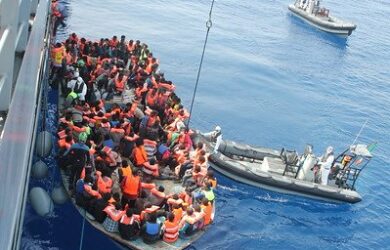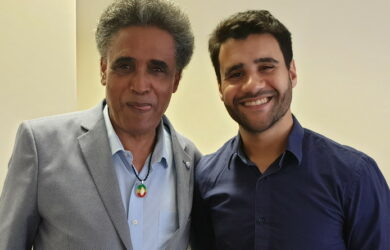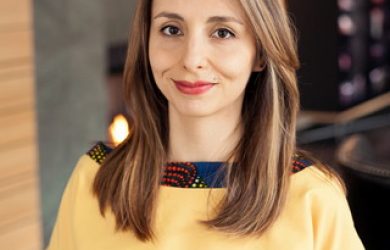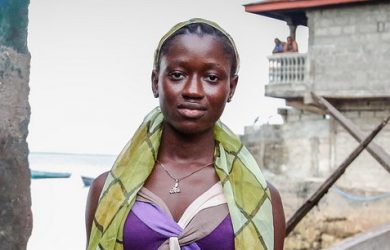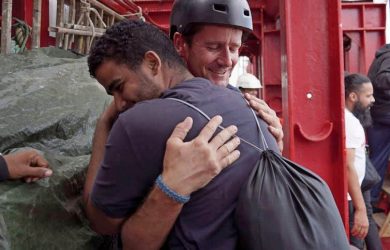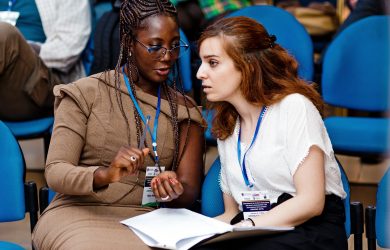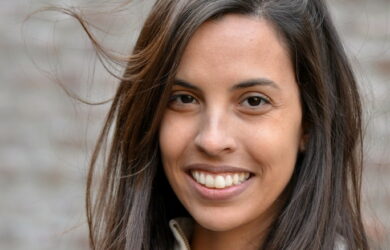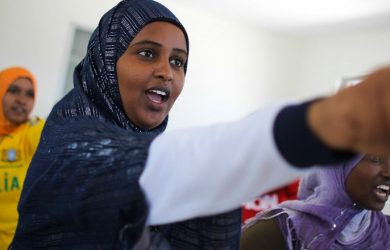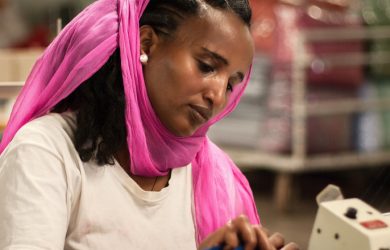- ABOUT US
- RESEARCH
- EDUCATION
- The Graduate School
- PhD Programme
- MSc Programmes
- Capacity Development
- News
- Design and Evaluation of Public Policies (DEPP)
- Design and Evaluation of Innovation Policies (DEIP)
- Evidence-Based Policy Research Methods (EPRM)
- Migration Management Diploma Programme (MMDP)
- Moving the Migration Policy Agenda Forward (MMPAF)
- Online Courses
- Short Courses (Masters)
- Tailor-made programmes
- UNU-MERIT, ITU Academy Training Centre
- Alumni
- Academic Funding
- NEWS
- EVENTS
- PUBLICATIONS
- LIBRARY
Once a destination for migrants, post-Gaddafi Libya has gone from transit route to containment
24 August 2020
Amid profound instability unleashed with the Libyan civil war and rival factions vying for power, conditions facing the roughly 650,000 migrants who remain in Libya have been dire. Those living in the community are vulnerable to extortion, violence, and slave-like work conditions, while migrants held in detention centres may experience overcrowding, sexual abuse, forced labour, torture, and deprivation of food, sunlight, and water. Amid entrenched fighting around Tripoli, including a deadly airs...
Continue Reading →Cut short by COVID-19: My research secondment to South Africa
16 June 2020
I flew into Pretoria, South Africa, in March 2020 – just when COVID-19 was becoming a fully-fledged international crisis. Working under the umbrella of the CatChain project, I aimed to access and use the confidential firm-level dataset managed by the National Treasury of South Africa (NT). This is a relatively new dataset and, in partnership with our sister institute UNU-WIDER, the NT has welcomed researchers from all around the world to do research using these South African data. My PhD project...
Continue Reading →Making the labour market more inclusive for refugees: New $100k research project
18 May 2020
PhD fellow Mariajose Silva-Vargas from UNU-MERIT and graduate student Francesco Loiacono from the Institute for International Economic Studies have been awarded two grants — from the Peace & Recovery Competitive Fund from Innovations for Poverty Action (IPA) and the Private Enterprise Development in Low Income Countries (PEDL) research initiative — for a total of US$ 100,000 to study labour market integration of refugees in developing countries. Refugees and access to labour mark...
Continue Reading →The five criteria low income countries must have in place for lockdowns to work
04 May 2020
A joint post by Sam Jones, Eva-Maria Egger and Ricardo Santos, United Nations University – WIDER As the COVID-19 virus has spread across the globe, developing countries are starting to enact many of the same policies used in China, Europe and North America to contain the virus. But are these policies appropriate in low income contexts? To help think about this we propose a simple index of lockdown readiness which identifies the share of households that could feasibly shelter at home for a ...
Continue Reading →When Mother Earth sends a message: We must respond! #EarthDay2020
22 April 2020
#EarthDay2020 The Green Academy Project proved to me yet again that if we as academics participate in co-designed projects with social enterprises and NGOs, we can create real community value as well as scientific papers! This project is also a milestone for SITE4Society for it is serving to train students from Maastricht University’s School of Business and Economics, making them grow and providing them with splendid material for their Bachelor dissertations...
Continue Reading →Eritrean migrants face torture in Libya: What the international community can do
19 November 2019
Tens of thousands of East and West African migrants face violence, abuse, torture and loss of life as they transit through Libya to reach the Mediterranean. Are the migrants victims of human smuggling, human trafficking or neither? In the absence of a stable government in Libya, what can European countries do to prevent the loss of life and torture of migrants in Libya?...
Continue Reading →Leave no waste behind: Exploring bottom-up initiatives in Ghana
18 November 2019
Waste management is a massive problem for many of the world’s fastest growing economies, as sacrifices are made on the altar of ever-expanding consumption. Ghana, a country in West Africa, is no different. In 2012, a World Bank report said that as many as 19,000 Ghanaians were dying prematurely and $290 million were being lost every year, mainly due to poor sanitation and hygiene. Our SITE4Society team led a site visit and interdisciplinary workshop to understand the issue from various angles, b...
Continue Reading →Learning & teaching in West Africa: The importance of partnerships
15 November 2019
There are many challenges that can arise when collecting data in developing countries: from heavy rain that stops your data collection for a few days, to arriving at a remote school in your sample just to find out that it is closed for the day due to some local festivities, to challenges in recruiting the right pool of capable enumerators. It is important to start with a well-developed plan for your data collection – but one that has wiggle-room or flexibility to adjust to unforeseen situations....
Continue Reading →Political empowerment of women in Africa: Influence or number?
13 November 2019
In recent decades women’s political representation has significantly increased in Africa. From 2000 to 2018, the proportion of women parliamentarians almost doubled, and women’s representation in cabinet increased fivefold to 22% between 1980 and 2015. Unfortunately, the numbers do not necessarily imply influence....
Continue Reading →African countries can’t industrialise? Yes, they can
07 November 2019
Narratives are essential. Humans are, after all, “helpless story junkies”. Business and economic success depend much more than is commonly acknowledged on getting the narrative right. And if there is a narrative where getting it right or wrong matters hugely, it is the narrative about Africa’s industrial development....
Continue Reading →Archives
Contact
UNU-MERIT
Boschstraat 24
6211 AX Maastricht
The Netherlands
T: +31 43 388 44 00
Email: info@merit.unu.edu
Boschstraat 24
6211 AX Maastricht
The Netherlands
T: +31 43 388 44 00
Email: info@merit.unu.edu
Partner sites
Newsletters
© 2024 UNU-MERIT | Maastricht University


